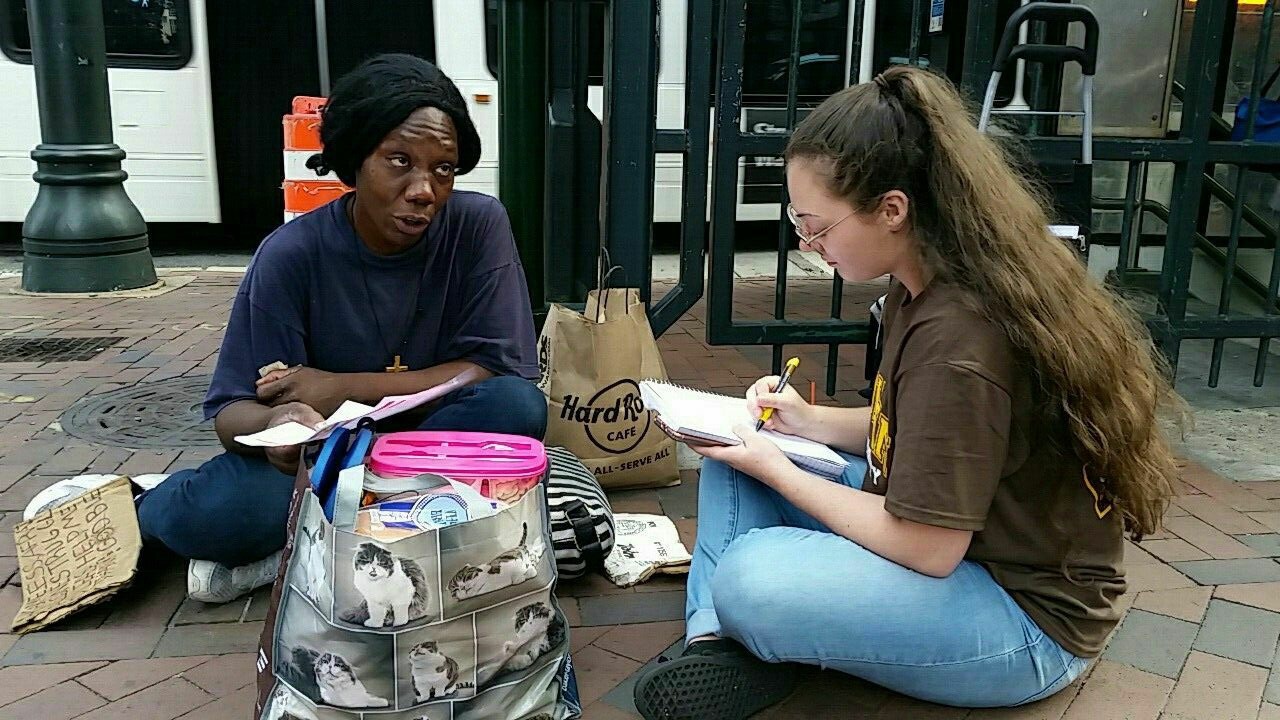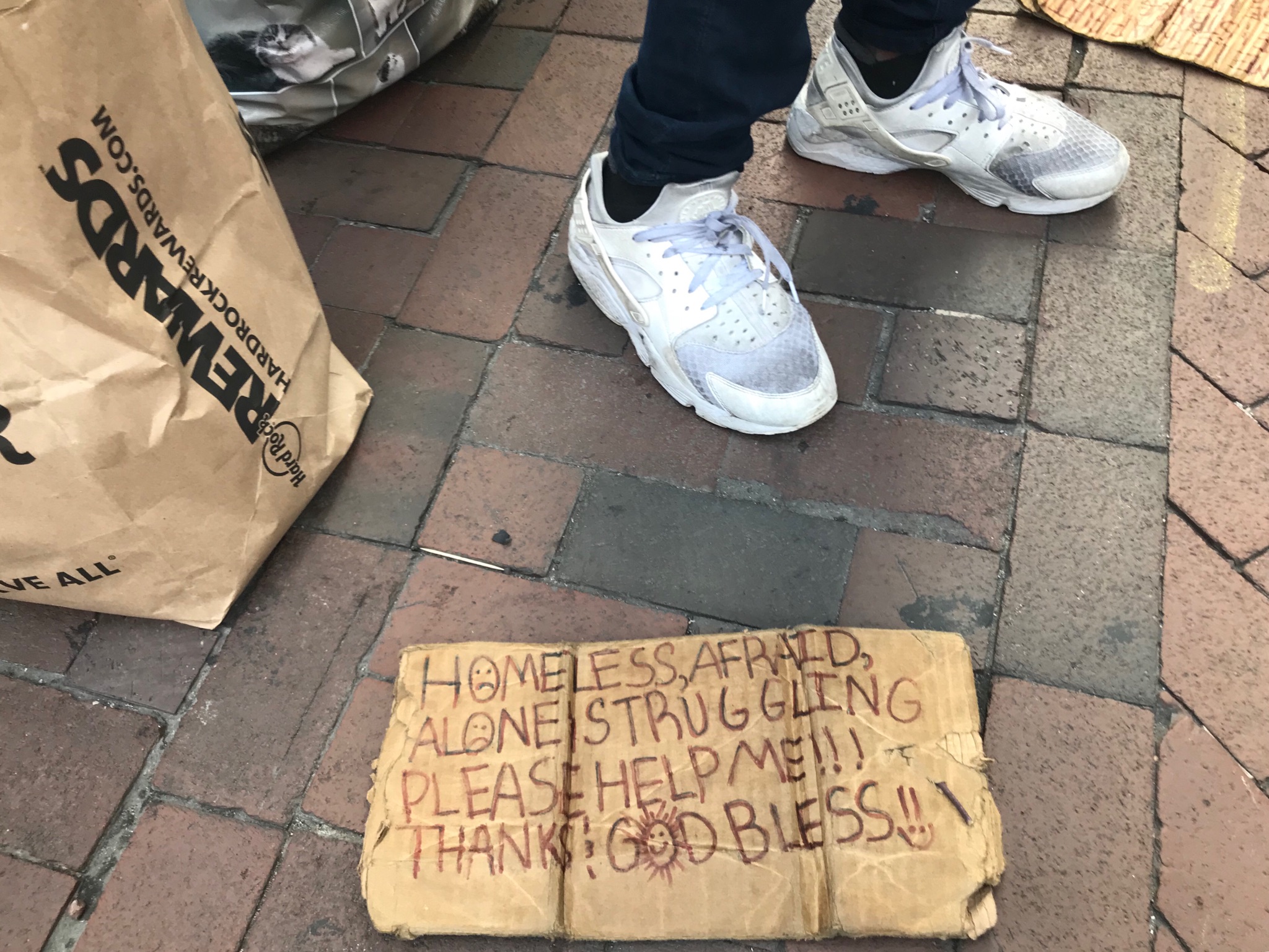Tamika sat with her back supported by the unforgiving bars of the subway gate. Her eyes trailed after passersby and rolled back into her head as she tilted her chin up and rested her head between the rails.
As we approached her, her eyes lit up with recognition.
“You go to Rowan University,” she asked, reading my t-shirt, “That’s where I graduated.”
A smile spread across her face when she told me that she was also from Jersey, and that she grew up just an hour away from my hometown in Hammonton.

“I come from a middle upper class family,” Tamika said with a trace of disbelief in her tone. “I’ve done traveled the world.”
Some of her work experience includes managing a casino, being a department manager at Walmart, an optical technician at Your Vision, and acting as a shift manager for Steven Starr.
Tamika graduated from Rowan University with a Bachelors in business, a degree that took her all over the country. Once she got a taste for freedom, she couldn’t stop. She wanted to see the world.
Her career allowed her to travel to Paris and Cancun, as well as landmarks all throughout the United States, according to Tamika. Most of these trips were vacations that she would invite her family on.
Having gotten used to a certain lifestyle, Tamika began to live beyond her means.
“At first it was okay, but then my boyfriend died,” she said, her bright drown eyes dimmed as she chocked the last word out. Her bottom lip began to quiver, just enough to be noticeable despite her attempt at keeping a brave face. “I couldn’t keep up with the bills myself.”
He passed away on May 5th, about three months after the time of our interview in August. They had been together for ten years.
Her entire world tilted on it’s axis.
“I used to stereotype everyone too,” she said, matching the stare of a stranger to further her point. “I used to think everybody (who was homeless) was a drug addict or an alcoholic, but I found out that a majority of people out here have a mental illness and they don’t have their medication, and that’s why a lot of people are out here. There are a lot of people who are on drugs too, but a majority of them, that I’ve met, have had a mental illness.”
It is hard for her to believe that she is now in the position that she placed such heavy judgement on. Tamika says that she has a 50/50 chance of someone actually stopping to listen to her pleas for assistance.
One thing that she is not worried about is finding something to eat, according to Tamika strangers are more than willing to share a meal with her. She is confidant, thanks to the kindness in others, that she will never have to go to sleep hungry, wherever she ends up that night.
“I sleep wherever I can,” she said. “Mostly on the streets.”
At age 43, this was her fist time experiencing homelessness and had been living on the streets for two months at the time of our interview.

Fortunately, Tamika has had no bad encounters while living on the streets. She credits the police for treating her with kindness, unlike some of the other homeless that we have asked the same question to.
“They treat you how you treat them,” she says. “They treat you importantly, and I haven’t had any issues.”
Since becoming homeless, Tamika has made few platonic relationships with other homeless individuals, but has no desire to get too close to anyone.
“We tend to share with each other,” Tamika said on the topic of receiving care packages. “But some will try to steal from one another too,” she said as a disclaimer.
The hardest part of being homeless to Tamika has been being alone, she lives in fear when she sleeps on the streets.
“Recently, since they know that I’m out here by myself, a lot of men bother me,” she said, her eyes widening as the words began to spill out of her mouth more quickly. “And I’m always constantly in fear and afraid, of course, that I’m going to get robbed, or worse.”
Tamika used to keep a cup in front of where she said to collect donations, she stopped doing this after the cup had been stolen on multiple occasions. Her phone has also been stolen more than once.
“I’ve been asleep and woken up to guys standing over me,” she said. “It’s scary, being on the streets.”
She has, however, had a hard time in obtaining assistance from the state of Pennsylvania.
“I’ve been denied Social Security,” she said, “Food stamps, I couldn’t get. Welfare, unfortunately you are not allowed unless you have a child.”
Tamika has not been successful in her reach for assistance, meaning that whatever income she was getting at the time came from panhandling on the streets.
“I panhandle, I try to take care of things, like when my ID was stolen. I try to do the footwork to get myself out of this situation,” Tamika said, describing a typical day for her.
Not letting this discourage her, she has been working with Outreach, a homeless prevention program based in Philadelphia.
“But if you’re not a drug addict, or you don’t suffer from mental illness, then you’re not a priority,” Tamika fixed her eyes on her stained shoelaces as she said this.

Her next step to regaining permanent housing is to remain persistent.
Although Tamika has been offered a few jobs since she has been homeless, her top priority remains to obtain housing. Stability, having somewhere to go after work to take care of basic needs like showering, sleeping, and preparing meals, is essential to keeping employment and maintaining good mental health, according to Tamika.
“I’m going to stay on Outreach, keep on them, keeping in contact with them and calling them,” she said confidently. Tamika has already visited multiple shelters in the city, they were all full and she was placed on a waiting list.
Since being on the streets Tamika has had a difficult time in reaching out to her family, the only person that she had been able to get in contact with was her sister.
“I call her every once in a while,” she said, “but, other than that, I’m alone.” Tears began to well up in Tamika’s soft brown eyes and she pushed a loose strand of dark hair away from her face, trying to disguise the fact that she was crying.
Tamika also has two children that she had not been in contact with recently.
“It’s just because I don’t want them to worry,” she explained, “I had to give them up for now because of my situation, I don’t want them to know that I’m out here on the streets.”
Not wanting to end the interview, Tamika continued talking with tears streaming down her face.
“Once in a while people stop to talk to me, but not very often,” she said. She admits that this does not bother her as much, sometimes she prefers to be left alone. “Because, a lot of the time, there’s an ulterior motive that’s not good that they expect by the end of the conversation.” She sniffled.
Tamika still seemed to be in disbelief that she had ended up on this path, considering her degree and work experience.
“Something that the public should know, is that it can happen to them too,” she said flatly. “And I would have never thought–I lived better than a lot of these people that are out here walking around.”



Leave a comment